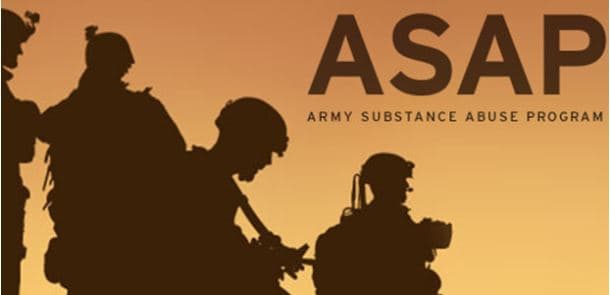The army substance abuse program is the way in which the United States military conducts drug screening and urinalysis. The purpose of the Program is to prevent soldiers from taking drugs that could endanger others or themselves. Having a proper substance abuse program in place greatly impacts how the Army operates, especially if the drug policy is followed by all members. You can check other related topics on our website, AKO Offline.
The Army Substance Abuse Program (ASAP) helps to strengthen the health and combat readiness of Soldiers, civilian corps members, and families. ASAP is a comprehensive program that focuses on prevention, education, and treatment. It is an evidence-based substance abuse program.
The Army Substance Abuse Program identifies Soldiers who have alcohol and drug problems. These Soldiers are then referred to a treatment facility. In some cases, Soldiers may be referred to a military medical facility. Depending on the severity of the problem, the Soldier may also be referred to other agencies.
As part of the treatment process, Soldiers will be required to undergo a series of weekly sessions at the Alcohol Treatment Center at Brian Allgood Army Community Hospital. The initial treatment includes meetings with Alcoholics Anonymous. The Soldier will also be enrolled in an outpatient program during this period. This Program lasts from 30 days to 360 days.
For active duty Soldiers, the first step in accessing assistance is to seek help from their commanding officer or unit company commander. They may also seek help from a primary care provider, chaplain, or Civilian Personnel Advisory Center member.
Using prevention measures and rehabilitation, the Army Substance Abuse Program ensures that Soldiers are not abusing drugs or alcohol. Additionally, the Program also provides education, outreach, and assessment services to help prevent substance abuse.
After identifying potential issues, Soldiers can receive targeted intervention, including referrals to treatment facilities, a DA 8003 Referral Form, and Targeting Prevention Training. If the Soldier needs additional help, they can obtain assistance through the Employee Assistance Program.
Soldiers can also be screened by the unit/company commander and referred to a treatment facility for evaluation. These Soldiers will also receive annual substance abuse training. However, Soldiers are financially responsible for the payment of the treatment.
Soldiers should contact their commanding officers and request to be referred to the Substance Use Disorder Clinical Care (SUDCC) program. SUDCC offers diagnostic evaluations, as well as hospitalization, if withdrawal symptoms occur.
A Soldier can receive referrals for the Program through his or her primary care provider, chaplain, Civilian Personnel Advisor Center member, or commander. When a Soldier requests a referral, an affidavit of mail must be completed and returned. Upon receipt, the commanding officer must complete a DA 8003 Referral Form.
Army substance abuse program regulation

The Army Substance Abuse Program regulation (AR 600-85) outlines procedures for the testing, detection, and treatment of alcohol and other drug abuse in the United States Army. This Program is available to both active duty and civilian corps members.
The Army Center for Substance Abuse (SCSA) designed the Program, including the education and training programs. They also provide information on the Program and assist Soldiers with substance abuse problems.
The Army Substance Abuse Program’s main mission is to return soldiers to full duty status. It has five objectives: prevention, early detection, treatment, rehabilitation, and returning to duty.
One of the Army’s most prominent prevention efforts is random drug testing. Every Soldier must submit a valid sample for testing each year. A biochemical test, also known as a urinalysis, is used to detect alcohol and other drugs.
Another program that the military uses to combat substance abuse is the Army Substance Abuse Program (ASAP). ASAP is a system designed to provide Soldiers with the resources they need to help them overcome substance abuse. As part of the ASAP, Soldiers are referred to a treatment facility for assessment and rehabilitation.
If a Soldier exhibits symptoms of problematic substance use, he or she is evaluated by a unit commander. Depending on the severity of the condition, the commander may order the individual to undergo a biopsychosocial evaluation, waive communication privileges, or initiate disciplinary action.
The URI, or Unit Risk Inventory, is an 80-question survey that screens for risk-taking behaviors and attitudes that might compromise Unit readiness. In addition, the Reintegration Unit Risk Inventory, or R-URI, is a similar survey given to Soldiers upon their return from deployment.
Similarly, the BH clinic evaluates all substance abuse referrals, and shares recommended treatment recommendations with the unit commander.
Although the Army Substance Abuse Program’s most important goal is to help Soldiers recover, they do have a few rules they must follow. These rules include notifying the unit commander in the case of an overdose.
Lastly, Soldiers must sign a written consent form to release information to a civilian treatment facility. For example, DOT breath tests must be referred to an installation SAP.
Army drug policy

The Army Substance Abuse Program (ASAP) is an anti-drug and alcohol abuse program for the Army. It is administered by the Army Center for Substance Abuse Programs. In addition to implementing alcohol and drug risk reduction strategies, the Program emphasizes prevention and rehabilitation.
If you are a Soldier, you will likely be tested for substance abuse at least once during your time in the Army. These tests can be performed as part of routine inspections or for medical reasons.
If you test positive, you can face significant administrative action. This includes being separated from the service and having your rank reduced. You may also be subject to criminal prosecution. Depending on your rank and the nature of the offense, you could be facing a court marshal or a dishonorable discharge.
According to the Army’s Office of Drug Enforcement, the military employs a rigorous drug testing program. Each month, the military screens 60,000 urine samples. They also check for cocaine, meth, heroin, and barbiturates. However, not all chemicals are checked in every sample.
Besides testing for drugs, the military has a Limited Use Policy that prevents the use of evidence of substance abuse to punish or negatively affect a Soldier. Regardless of the nature of the violation, the policy aims to motivate Soldiers to seek help.
Upon discovery of an illegal or problematic use of a drug, the Soldier’s unit commander is tasked with reporting the information to appropriate authorities. Commanders must follow standard procedures for this process. For example, the commander must document the notification procedure and deliver the required documentation in a timely fashion.
Moreover, Soldiers who test positive for an illegal drug must submit a valid sample for testing. A sample can be provided by a Soldier or by his or her primary care provider. All Soldiers must provide a valid sample annually.
The Army’s regulation 600-85 describes the process for testing Soldiers for illicit drugs. The regulation outlines the procedure for both the Civilian Corps and the Army Reserve.
Generally, the best way to discover a problem is to seek help. Soldiers can access services through BH clinics, their primary care providers, and other agencies. During treatment, they must provide written consent to release health-related information.
Army urinalysis regulation
The Army urinalysis regulation substance abuse program (SAAP) is a program that is designed to help identify and address substance abuse problems in Soldiers. ASAP focuses on the prevention, treatment, and reduction of the effects of alcohol and drug abuse. It is also intended to return Soldiers to duty as soon as possible.
ASAP offers a number of services, including referral to an appropriate treatment facility. In addition, the Program collects data on the prevalence of substance abuse within the Army. As a result, it helps commanders take appropriate action.
To be eligible for the Program, Soldiers must submit a urine sample for testing. Approximately 60,000 samples are collected each month. These samples are sent to the Department of Defense’s urine testing laboratory. Each sample is tested for cocaine, amphetamines, morphine, heroin, and marijuana.
A positive test result can result in disciplinary action. For example, a Soldier may have his communication privileges waived by a unit commander. If a soldier fails a test, he could be subject to court-martial or separation.
A positive drug test result indicates that a Soldier has a substance use disorder. However, it does not necessarily mean that the Soldier has an addiction. Instead, the test identifies the extent of the problem.
During the assessment, Soldiers will be informed of their options for treating their SUD. Some of these options include BH services and a rehabilitation program. They can also request assistance from their primary care provider, chaplain, or any other NCO in their chain of command.
Military readiness emphasizes education, prevention, and treatment. Alcohol and other drug abuse is not compatible with service in the USAR.
Soldiers who refuse or fail to complete an alcohol/drug rehabilitation program will be separated from the Army. Alternatively, a Soldier’s commander can order the Soldier to be impeached or removed from the unit. Depending on the circumstances, a soldier’s commander can order probable cause testing, self-identification testing, or voluntary consent testing.
Once a Soldier’s commander has ordered a test, the Soldier will provide a specimen for testing. During the assessment, the chaplain will inform the Soldier of his treatment options.
